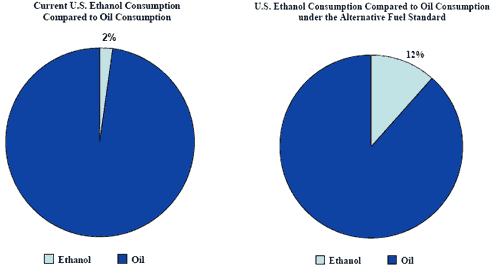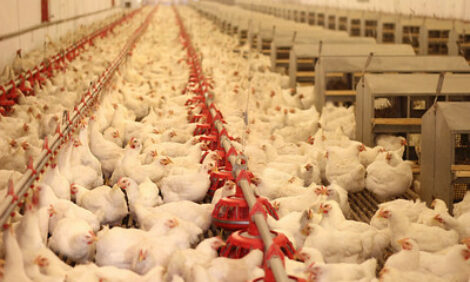



Can Ethanol End Our Oil Addiction?
Roger H. von Haefen, Assistant Professor at the Department of Agricultural Resource Economics at North Carolina State University, explains why ethanol production in the US will not solve the country's oil problems. He presented this paper at the 2008 North Carolina Turkey Industry Days."America is addicted to foreign oil," declared President Bush in his 2006 State of the Union address. Indeed, we currently consume 7.6 billion barrels of oil per year, over half of which is imported. Our heavy dependence on imported oil, coupled with growing concerns over the contribution of fossil fuels to global climate change, has heightened interest in alternatives to gasoline – especially ethanol.
The potential for ethanol – and limitations – in helping the United States deal with its dependence on oil will be discussed.
Why Ethanol?
Recent developments – hurricanes Katrina and Rita, the war in Iraq and growing instability in the Middle East, declines in oil production from violence-scarred Nigeria and leftist Venezuela, and China's explosive growth – have generated significant disruptions to the global oil market. The result has been higher prices at the pump for American consumers, peaking at roughly $3.00 a gallon. We consumed 143 billion gallons of gasoline in 2006, or about 700 gallons per driver. Despite significantly higher prices, our demand for oil grew by 0.3 per cent in 2005 and 1.0 per cent in 2006. Because an increasing share of domestically consumed oil is imported from abroad, our addiction to foreign oil remains strong. This reality has left many observers concerned about energy security and the need for greater energy independence.
Our oil consumption raises another reason for concern – the possibility of long term, irreversible climate change. A growing consensus within the scientific community, reflected in the Intergovernmental Panel on Climate Change's recently released Fourth Assessment Report, suggests that human activities, primarily the burning of fossil fuels, are 'very likely' behind the increased atmospheric concentrations of 'greenhouse' gases (GHG). According to numerous polls, a majority of Americans favour government intervention that would constrain US greenhouse gas emissions. Moreover, business and political leaders are now advocating a range of policies aimed at capping US emissions, and the prospects for significant new federal regulation of greenhouse gas emissions seems likely in the 110th Congress.
Responding to the changing political environment, President Bush, in his 2007 State of the Union address, proposed to 'reduce gasoline usage in the United States by 20 per cent in the next 10 years.' The president's plan to achieve this ambitious goal involves increasing the alternative fuel standard from 7.5 to 35 billion gallons of renewable fuel by 2017, a seven-fold increase over current consumption.

By a large margin, the primary renewable fuel currently used in the United States is ethanol. Ethanol is produced from domestically grown corn and, unlike oil, generates no greenhouse gas emissions when burned in automobiles. These two attributes would make ethanol seem like an ideal alternative to oil-based gasoline.
Why should we not support American farmers instead of nations hostile to our interests, especially if we can improve the global environment in the process?
Reasons for Scepticism
* "Scientists estimate that the 'life cycle' greenhouse gas emissions generated from ethanol are only about 13 per cent less than those from gasoline" |
A number of factors should be considered before concluding that ethanol can rid of us our foreign oil addiction. First, America's appetite for oil is enormous.
As noted above, the United States currently consumes about 7.6 billion barrels of oil a year. Let us assume that we can achieve President Bush's goal of 35 billion gallons of renewable fuels, i.e. ethanol, by 2017. Domestic ethanol production was about 5 billion gallons in 2006, implying that the Bush proposal would increase ethanol production by 30 billion gallons. Ethanol has roughly two-thirds the energy content of gasoline, and thus 30 billion gallons of ethanol is equivalent to 20 billion gallons of gasoline. Since one barrel of oil can produce about 20 gallons of gasoline, that 20 billion gallons of gasoline is equivalent to roughly one billion barrels of oil, or 12 per cent of our current consumption.
At present, we import 20 to 25 per cent of our total oil consumption from the Middle East, Venezuela and Nigeria, and the Department of Energy predicts that this percentage will likely grow in the future. Therefore, we will still be importing oil from these volatile regions even if the president's ambitious goal is achieved.
| Some Ethanol Math (bg = billion gallons; bb = billion barrels) |
||
|---|---|---|
| Measure | Volume | |
| A | Ethanol production under President Bush's proposed Alternative Fuel Standard | 35 bg |
| B | Current (2006) US ethanol production | 5 bg |
| C | Net increase in ethanol production (A – B) | 30 bg |
| D | Energy equivalence of increased ethanol production1 (C × 0.67) | 20 bg |
| E | Energy equivalence increased in barrels of oil2 (D ÷ 20) | 1 bb |
| F | 2006 US oil consumption | 7.6 bb |
| G | Percentage reduction in US oil consumption from proposed Alternative Fuel Standard (E ÷ F) | 12% |
| H | Percentage of US consumption curently imported from the Middle East, Nigeria, and Venezuela | 20-25% |
2 One barrel of oil is equivalent to 42 gallons of oil can be refined into 20 gallons of gasoline.
Moreover, even if we were able to completely eliminate our need for imported oil from unstable regions, we would still be vulnerable to supply disruptions and price shocks like the ones we have recently experienced. This reality arises because the market for oil is truly global in scale. Oil prices are determined by the interaction of global supply and demand. Disruptions in any oil-producing region will affect the price that consumers pay throughout the world. Isolating America from the vicissitudes of the global oil market is simply not possible.
A second reason for scepticism is the cost of ethanol production. Given current technologies and the cost of corn, the wholesale price of ethanol is currently around $2 a gallon. Because it takes 1.5 gallons of ethanol to produce the same amount of energy found in a gallon of gasoline, the energy equivalent wholesale price of ethanol is about $3 well above the current retail price of gasoline. A $0.51 per gallon subsidy, $0.54 per gallon tariff on imported ethanol, and a suite of smaller federal, state and local subsidies make domestically produced ethanol more profitable. But gasoline is still cheaper unless its retail price rises above $3 per gallon.
Another cost concern arises with distribution. Ethanol's chemical structure is such that it easily absorbs water. This attribute means that ethanol cannot be transported through low-cost pipelines but instead must be shipped in special containers by rail, truck or barge. These added costs explain in part why E85 ethanol (85 per cent ethanol, 15 per cent gasoline) is generally only available in states with ethanol refineries, e.g. Iowa. Unfortunately, these transport costs are not likely to fall with increased ethanol production.
In addition to costs, the environmental benefits of ethanol are questionable. A considerable amount of greenhouse gas-generating energy is used to produce corn and to convert it to ethanol. Ethanol embodies more energy than what is needed to produce it, but the net energy gain is only about 25 per cent. Additionally, application of nitrogen fertilizers on corn fields often leads to nitrous oxide emissions, a particular potent greenhouse gas. In total, scientists estimate that the 'life cycle' greenhouse gas emissions generated from ethanol are only about 13 per cent less than those from gasoline.
Finally, increased ethanol production raises 'fuel versus food versus environment' trade-offs. If total acreage in agriculture is held fixed, growers' substitution towards corn and the diversion of corn to ethanol production will lead to higher agricultural prices. These higher prices are already surfacing – corn is nearing $4 a bushel, almost double its price of one year earlier. The livestock industry, which uses roughly 60 per cent of all corn as feedstock, is feeling the pinch. Consumers can expect to pay higher prices for corn, meat and other food products in the near term.
One way to keep prices down is to shift more land into agriculture, perhaps, as the president has suggested, by taking land out of the Conservation Reserve Program (CRP). Increasing agricultural acreage might keep food prices in check but it would come with an environmental cost. CRP lands are generally highly erodible, and pulling them back into production would likely result in more run-off into our lakes, rivers and streams. The costs of additional water pollution must be weighed against the benefits of lower food prices.
What Can We Do?
The above discussion calls into question the potential energy security and environmental benefits of increased corn-based ethanol production. What are better options to address these concerns? First, although the net benefits of corn-based ethanol are small, the potential gains from cellulosic ethanol – derived from switch grasses, wood chips and agricultural waste – may be much greater. The engineering necessary to transform these omnipresent, cheap feedstocks into ethanol are not cost-effective at present but many scientists are optimistic that significant technological breakthroughs are within reach. The Bush administration has proposed an expansion of research funding that should speed these innovations.
Second, public policies that encourage fuel economy should be pursued. A 2002 National Research Council report documents a number of relatively inexpensive fuel-saving technologies that would quickly pay for themselves. Government policies, such as a higher gas tax, a tightening of the Corporate Average Fuel Economy (CAFE) standards, or the adoption of revenue neutral 'feebate' policies that simultaneously tax fuel inefficient cars and subsidize fuel efficient cars, could encourage auto producers to adopt these technologies in the near term.
Together, these policies may not eliminate our addiction to foreign oil but they can reduce our oil consumption and improve the global environment more cost effectively than corn-based ethanol.
February 2009
Further Reading
| - | You can view other presentations from the 2008 North Carolina Turkey Industry Days by clicking here. |








